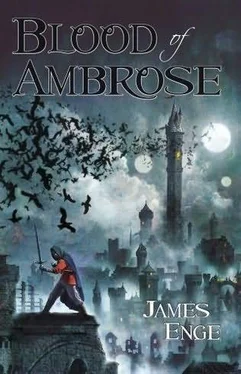When he reached the sea, he took up the controls and directed the spider eastward along the shore. Once he was past the city he took his craft to land and began a long, oblique walk toward his goal. He went north through the grave lands, then finally turned east again when he was north of Gravesend Field. He sped across the plain between the grave lands and the old riverbed on the Tilion. Then he took the dry riverbed into the heart of the Old City.
This occupied a good deal of time; it was dark before his spider crawled out of the empty river course at what was once a riverside quay. The sky looked cloudy, too-as if it might rain for the first time in at least two thousand years over the Old City. Morlock hoped not, for various reasons, but the most he could do about it was hurry, which he had planned to do anyway.
He scanned the streets on all sides with the spider's external eye, but he never glanced at the sky. So he didn't see the dark cloud that had formed behind him, following him from the grave lands.
He approached the adept's tower from the east, the last direction he would be expected from, or so he hoped. But in the event it seemed not to matter. There were not, as he expected, companies of corpse-golems and Companions patrolling near the adept's tower.
Morlock didn't like it. True, the adept, even after centuries, could only have a limited number of undead servants. (They could not remain usable forever for very long.) Also true, he had many uses for these relatively few soldiers: he had to secure a large city and assault a well-defended castle.
But if Morlock's theory was correct, the adept's principal need was to protect his central mind-body nexus at all costs. If the tower was as unprotected as it seemed, either Morlock's theory was wrong or the adept was somewhere else-possibly hidden in the city.
"Didn't think of that, did you?" Morlock said to himself, in the jeering tone he used to no one else. "Well," he continued, more reasonably (you have to live with yourself), "I can always hope the defenses are better than they seem."
The hedge of dagger thorns was high, but the legs of Morlock's spider were longer when fully extended. He simply walked the spider-craft over the hedge.
There were no corpse-golems on the far side, either. Morlock saw the work-wheel Lathmar had described; it was abandoned. The bare patch in the ivy-thorn covering the tower could be seen, as well: the iron stairs were drawn up and the stone door closed.
Morlock considered. This, as a matter of fact, looked rather promising, as if the adept had drawn up his bridge, so to speak, and trusted to his moat and wall to defend him. If so, the wall would have defenders: the tower stair inside would be lined with the undead waiting to kill him. Morlock hoped so, as he had no intention of going that way.
He walked his spider over to the wall of the tower, away from the shut entrance.
There was a screeching sound; Morlock turned to see that a number of dagger thorns had pierced the steel hide of his spider.
"Ugh," he commented briefly, and went to the weapons locker. He was already wearing a mail shirt under his tunic; from the locker he took a helmet and put it on. He also took up Tyrfing, in a shoulder sheath that he duly strapped to his crooked shoulders. Then, of course, the jars. He strung them separately across his shoulders, as he would need his hands free for climbing.
He released the hatch and crawled out on top of the spider's body.
He found his hands were trembling as he stood there. In fact, he found to his surprise that he was frightened. It was not the height nor the fight he faced that frightened him. He had grown up in the Whitethorn Mountains and free-climbed many a rock face more treacherous than this. And he had fought and killed so many times that the prospect of doing so again, merely to protect his own life, rather sickened him.
But that was just it. This wasn't for his life. It would be better, in some ways, if he didn't live through this. But if he didn't succeed in destroying the adept, far more would be ruined than his own life. He thought of Wyrth facing the second death, of his sisters facing the mind-torments the adept would inflict, little Lathmar…. The boy would never break, that Morlock knew, but what horrors he might have to face before he died!
We should have fled We should have waited for the wise ones from the Wardlands. Together, Illion, Norea, and I could have killed this thing. I wish I had a drink.
He put his trembling hands over his face and stood there until he grew still. Then, the voices in his head grown quiet, he took the first jar in his hands and stepped toward the thorns.
The jar was made of aethrium; inside it was phlogiston. In the hours before the last council, Morlock had dephlogistonated everything he could lay his hands on, while Wyrth frantically worked every piece of aethrium Morlock had in his workshop into suitable containers. In the throat of each jar was a piece of flint that scraped against a metal wheel when the cap of the jar was flipped open. The resultant spark ignited the upward-rushing phlogiston, resulting in a sheet, a rising cloud of flame.
Morlock flipped open the first jar, holding it among the dagger thorns. A river of flame crept uphill through the dark ivy-thorn, spreading out in many branches across the face of the adept's tower.
Morlock tested the tip of a burning thorn with his bare thumb. The point was gone. The point of a thorn is its most flammable part, and a thorn without a point is just a branch. And the flame, of course, could not harm him, by virtue of the blood of Ambrose the Old. Morlock nodded grimly and climbed into the rising river of flame.
His greatest danger was that a burning branch would fail to support his weight, so he moved as quickly as he could up the side of the tower. When the fire began to give out (the thorns were green with the blood they had drunk) he uncapped another jar and the way of flame opened upward again.
He was intent on climbing when he heard the whisper of wings on the air, a hiss audible even above the crackle of burning thorns. He kept climbing with his feet and left hand, but with his right he reached back and drew Tyrfing.
As the hiss grew nearer he let his feet swing free and, hanging from his left hand, spun around so that his back was to the wall.
Silhouetted against the night sky, lit by the major moons, a winged but vaguely manlike figure was approaching, a great hammer in its hand. It must be one of the door gargoyles whom the King had seen outside the adept's chamber, Morlock guessed.
Once, when he was a young man, only just made vocate in the Graith of Guardians, his tutor in the arts of swordsmanship had made him dangle from a rope. Then Naevros had swung at him on another rope and battered him with a wooden sword as he passed. After several days of this, Morlock had gotten a wooden sword of his own to defend himself with.
I needed these skills once, fighting pirates in the Sea of Worlds, Naevros had told him, when he objected to the uselessness of the exercise. You'll learn them because I've sworn you can learn whatever I know, despite your crooked shoulders and your damned stubbornness.
The memory of Naevros's cool, tense, angry voice calmed him, as it had in many another fight, including the duel in which he killed Naevros himself. He braced his feet against the tower and lashed out with his sword, stretching out as far as his protesting left arm would permit. Tyrfing's edge crossed the gargoyle's hammer-bearing arm at the wrist and it screamed. Tumbling in the air, it recovered and flew away eastward. Morlock caught a glimpse of the thing's back in the moons' light as it flew off.
In a single motion, he sheathed Tyrfing and swung around to face the tower again. The thorns were burning in his hand; he had to move or fall. The gargoyle would be back in a few moments, but he had to make progress while he could. So he did, shouldering burning branches aside as he struggled upward.
Читать дальше












